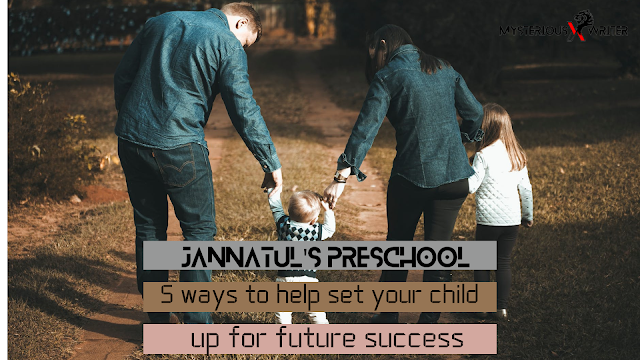Jannatul's preschool : 5 ways to help set your child up for future success
Parenting is considered one of the most difficult jobs in the world, but there's no formal education available on how to parent successfully. The good news is there are many ways parents can stimulate their babies' brains and use day-to- day events as exceptional learning opportunities.
Carlota Nelson, director of the documentary Brain Matters, shares five easy ,effective and science-backed tips that will help set your baby up for future success.
1. Stimulate baby talk and treat it as real conversation.
The sound and gestures that babies make might not always seem like much, but it's their only form of communication. Early childhood development scientists say we should stimulate baby talk and treat it as real conversation. Parents should respond to baby's sounds, cues and actions and engage with them throughout the day. The number of words a baby is exposed to will determine the amount of words in a child's vocabulary at age 2 and a child's reading levels later. Take baby babble seriously and encourage it.
2. Read to your baby to exercise language.
Babies might not be talking or reading yet but they're born ready to learn. Even at 3 months of age, they can distinguish each sound used in every language in the entire world. Every time you read out loud to your baby, you are building language skills. Make sure to point to the picture in the book and ask questions about the story and the characters.
Simple questions like "what are they wearing? "and "how many are there?" will engage your child's language skills. Reading to babies not only exposes them to new words but also creates a love for books and reading. Remember, leaders are readers , so why not start early?
3. Use everyday experience as learning opportunities.
For babies, each life experience is al about learning. Whether it's bath time, sorting laundry, cooking or running errands, these activities are great learning moments. Narrate what you are doing to stimulate language. Count and sort laundry to teach maths and play with food ingredients and textures to promote scientific thinking. Making faces that show different emotions is a great way to teach emotional intelligence.
4. Take play seriously
Young children are learning all the time. When they play, they're building important life skills. Make-believe play allows them to experience what it's like to be someone else and understand other's feelings. When they play with others, they're learning to compromise and take turns. Engaging in imaginative free play, like pretending a toy train can travel through spaces, sparks creativity and language as they learn to verbally express their ideas.
When they imagine new worlds, young children are learning to problem solve and create new possibilities. What seems like just fun is actually very important work. Take play seriously because play is serious learning. Avoid being on your device in front of your child too often. Research shows that makes children feel less important.
5. Lead by example.
Babies are genius impersonators. They pick up on everything they see you do. Until they talk, they become experts at reading faces and non-verbal attitudes and learn to mimic them. By watching your body language, how you treat others or how you react to a challenge, babies will adopt these attitudes and actions themselves. The way you act around your baby shapes the person they will become.
Include these five critical behavior's in your day and you'll dramatically improve your baby's chances to thrive in future. Giving your child the best tools for future success has nothing to do with money or extravagant learning resources. It has everything to do with you, your time and level of engagement.
Read More





Post a Comment